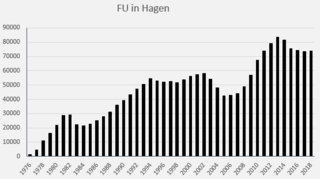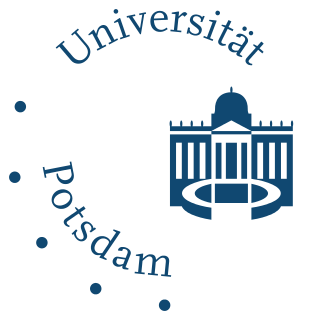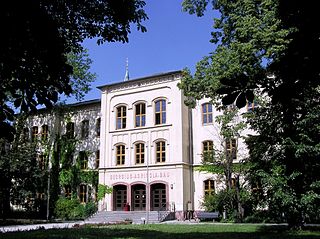Curriculum
The curriculum puts an emphasis on examining the European area from an economic, cultural, political and sociological perspective. During Colloquia and an obligatory excursion (to Brussels), the interrelations of the disciplines are linked and investigated. Additionally, the students' intercultural competences and research methods are trained.
Seminars of the following disciplines are included in the program: [4]
The interdisciplinary and intercultural approach teaches students to analyze European topics from a cultural, economical and political angle. Next to interdisciplinary, ECUE stresses international relations. Many of the available places are assigned to foreign students. [5] So far, students of 30 different nations (Africa, U.S.A., Asia, many European countries) were able to successfully complete the program.

Interdisciplinarity or interdisciplinary studies involves the combination of multiple academic disciplines into one activity. It draws knowledge from several other fields like sociology, anthropology, psychology, economics, etc. It is about creating something by thinking across boundaries. It is related to an interdiscipline or an interdisciplinary field, which is an organizational unit that crosses traditional boundaries between academic disciplines or schools of thought, as new needs and professions emerge. Large engineering teams are usually interdisciplinary, as a power station or mobile phone or other project requires the melding of several specialties. However, the term "interdisciplinary" is sometimes confined to academic settings.

Social science is one of the branches of science, devoted to the study of societies and the relationships among individuals within those societies. The term was formerly used to refer to the field of sociology, the original "science of society", established in the 19th century. In addition to sociology, it now encompasses a wide array of academic disciplines, including anthropology, archaeology, economics, human geography, linguistics, management science, communication science and political science.

Comparative literature is an academic field dealing with the study of literature and cultural expression across linguistic, national, geographic, and disciplinary boundaries. Comparative literature "performs a role similar to that of the study of international relations but works with languages and artistic traditions, so as to understand cultures 'from the inside'". While most frequently practised with works of different languages, comparative literature may also be performed on works of the same language if the works originate from different nations or cultures in which that language is spoken.

Intercultural relations, sometimes called intercultural studies, is a relatively new formal field of social science studies. It is a practical, multi-field discipline designed to train its students to understand, communicate, and accomplish specific goals outside their own cultures. Intercultural relations involves, at a fundamental level, learning how to see oneself and the world through the eyes of another. It is seeks to prepare students for interaction with cultures both similar to their own or very different from their own. Some aspects of intercultural relations also include, their power and cultural identity with how the relationship should be upheld with other foreign countries.

Economic sociology is the study of the social cause and effect of various economic phenomena. The field can be broadly divided into a classical period and a contemporary one, known as "new economic sociology".

Osnabrück University is a public research university located in the city of Osnabrück in Lower Saxony, Germany.

International School of New Media in Lübeck, Germany was an international, affiliated private institute at the University of Lübeck. It was closed end of 2011.

The University of Hagen is a public research university that is primarily focused on distance teaching. While its main campus is located in Hagen, North Rhine-Westphalia, Germany, the university maintains more than 50 study and research centers in Germany and throughout Europe. According to the Federal Statistical Office of Germany, it is Germany's second-largest university. The university was founded in 1974 as a public research university by the state Nordrhein-Westfalen and began its research and teaching activities in 1975. It was founded following the idea of UK's Open University to provide higher and continuing education opportunities through a distance education system in Germany.

The University of Potsdam is a public university in Potsdam, capital of the state of Brandenburg, Germany. It is mainly situated across three campuses in the city. Some faculty buildings are part of the New Palace of Sanssouci which is known for its UNESCO World Heritage status.
The University of Heidelberg's Heidelberg Center for American Studies (HCA) is a higher education and research center. It was founded in 2004, making it the newest institute of Germany's oldest university. The Heidelberg Center for American Studies opened its first office in the spring of 2003. By October 2004, HCA was officially inaugurated. In the summer of 2006 the HCA moved into its present offices located in a historic building in the old city center of Heidelberg- Curt und Heidemarie Engelhorn Palais, Hauptstraße 120, 69117 Heidelberg. The institute is funded through public and private financial partnership. The founding director and former director of the institute is Prof. Dr. Dr. h.c. Detlef Junker. In February 2018, Prof. Dr. Welf Werner became the second director of the HCA and was also appointed Professor of American Studies at the Faculty of Economics and Social Sciences HCA makes exceptional contribution to interdisciplinary academic and cultural expertise on the United States in Europe. Through public lectures, debates, exhibitions, and panel discussions, the institute educates and provides the public with credible insight on the United States as a nation, and an important transatlantic partner. The Center facilitates discussions between academia and the public, creates and strengthens transatlantic networks. The HCA offers B.A., M.A., and Ph.D programs in American studies. Students are competitively selected, receive first class education and are mentored by highly qualified professors/scholars.
The Florida State University College of Social Sciences and Public Policy, located in Tallahassee, Florida, is one of fifteen colleges comprising Florida State University (FSU). The college was founded in 1973 and includes six departments: Economics, Geography, Political Science, Sociology, Urban and Regional Planning and the Askew School of Public Administration and Policy and interdisciplinary programs in African American Studies, Demography, International Studies, Interdisciplinary Social Science, and Public Health.

Modul University Vienna is a private university established in 2007 in Vienna, Austria, that focuses on social and economic development. In particular, it focuses on the areas of tourism, new media information technology, sustainability, business management, and public governance.

Kozminski University is a private, non profit business school in Warsaw, Poland, and is considered to be "Poland’s highest rated private university". It was established in 1993 and named after Leon Koźmiński, a Polish professor of economics and entrepreneurship, and also the father of Andrzej Koźmiński, the founder and the first rector of the school. It is one of the top business schools in the world, contains the Central Eastern campus of ESCP as of 2015, and the only institution of higher education in Poland, holding the "triple accreditation ". Less than 1% of business education providers worldwide hold these three major international quality accreditations. The Financial Times named the university as the best business school in Poland and Central Europe.

Vistula University is a non-public academic higher education institution based in Warsaw, Poland. It was established in 1992 as the University of Insurance and Banking. Its branch since 2019, is Aleksander Gieysztor Academy of Humanities in Pułtusk.

The Europa-Institut was founded at Saarland University in 1951, before the signing of the Treaties of Rome, and is the second oldest institution focused on European Integration. More than 5,000 students from all over the world have since graduated from the Institute. Having built on the content of its study program continuously and adapted to developments on the European level over time, the Europa-Institut today focuses on European law and international law with the possibility of specialization in specific study units.
The social sciences are the sciences concerned with societies, human behaviour, and social relationships.

The Willy Brandt School of Public Policy is a public institute for research and education in the field of public policy at the University of Erfurt. It was established in 2002, offering the first German study program leading to a Master of Public Policy (MPP) degree. The program has been accredited and reaccredited by ACQUIN. The working language is English. Until November 2009, the school was named Erfurt School of Public Policy (ESPP).

The Westsächsische Hochschule Zwickau - University of Applied Sciences Zwickau is a vocational university of about 3300 students located in Zwickau. Saxony, Germany. It offers Bachelor's, Master's and traditional German Diplom degrees in four core areas: Technology, Economics, Arts, and Life Sciences. The university also has further campuses in Markneukirchen, Reichenbach im Vogtland and Schneeberg.
Christian Krell is a German political scientist and adult educator. He is a professor of political science and sociology at the HSPV NRW (Cologne) and honorary professor at the Rheinische Friedrich-Wilhelms-Universität Bonn.
Christine Katharina Volkmann is a German Economist and holds the UNESCO Chair for Entrepreneurship and Intercultural Management at the Schumpeter School of Business and Economics of the University of Wuppertal.














